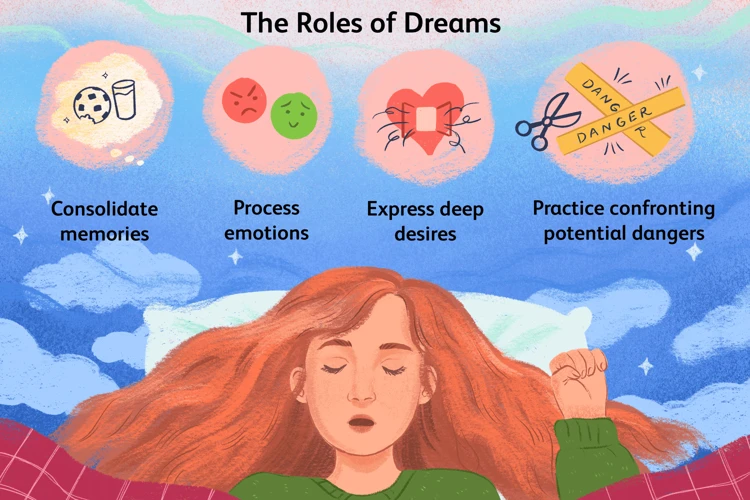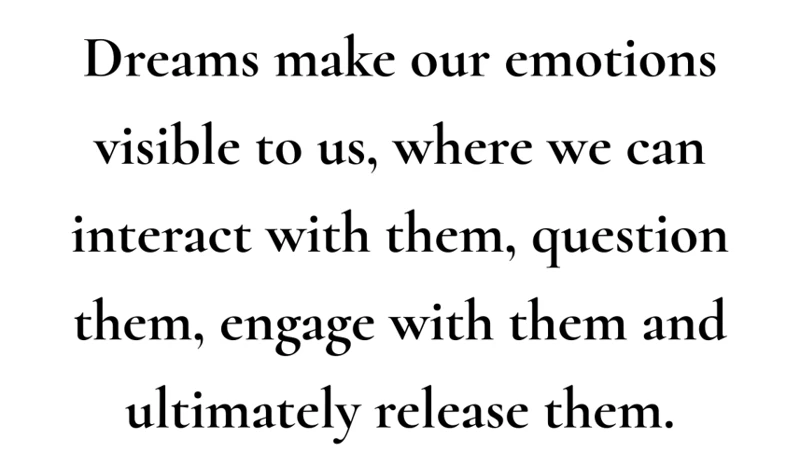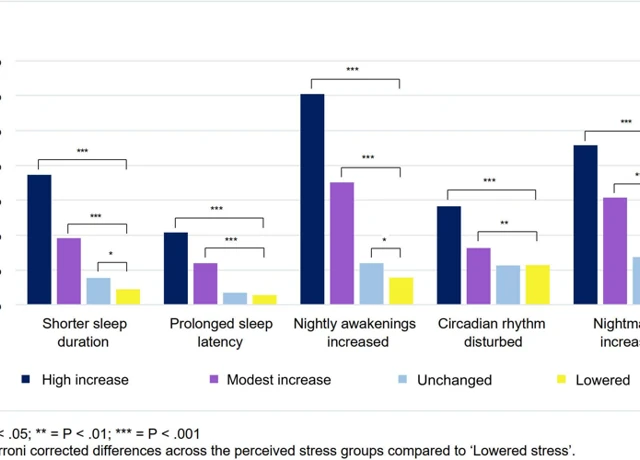Have you ever woken up from a dream where you were running late for an important event or appointment? These recurring dreams can be both perplexing and unsettling, as they often leave us wondering about their underlying meaning. In this article, we will delve into the world of dreams and explore the role of stress and anxiety in recurring dreams of being late. By understanding the characteristics of these dreams and the psychological interpretations behind them, we can begin to unravel the connection between our subconscious worries and the content of our dreams. We will provide strategies for managing stress and anxiety in order to alleviate the frequency and intensity of these unsettling dreams. So, let us embark on this journey of self-discovery and uncover the secrets that our dreams hold.
Understanding Recurring Dreams

Recurring dreams have long fascinated and bewildered dreamers throughout history. These enigmatic dreams occur when we experience the same or similar dream scenarios repeatedly over time. Understanding recurring dreams offers a glimpse into the mysterious workings of our subconscious mind. These dreams often carry significant meaning and may provide valuable insights into our unresolved issues, fears, or desires. They serve as a mirror reflecting our inner world and can be a powerful tool for self-discovery and personal growth. Common themes in recurring dreams can range from being chased, falling, or even being late for an event. By examining the patterns and symbols present in these dreams, we can begin to unlock their hidden messages and gain a deeper understanding of ourselves. To explore the specific recurring dream of being late, we must first delve into the psychological interpretation behind it and examine its common characteristics.
Definition of recurring dreams
Recurring dreams are a fascinating phenomenon that occurs when an individual experiences the same or similar dream scenarios on multiple occasions. These dreams have a repetitive nature, often replaying specific themes, settings, or events. The definition of recurring dreams lies in their frequency and consistency, distinguishing them from regular, one-time dreams. While the exact cause and purpose of recurring dreams are still debated within the field of dream analysis, they are widely recognized as significant and meaningful experiences. These dreams can occur over a period of weeks, months, or even years, creating a sense of familiarity and continuity within the dreamer’s subconscious mind. The repetitive nature of recurring dreams raises questions about their underlying messages and psychological implications. By exploring the symbolism and patterns within these dreams, we can gain insights into our deepest fears, desires, and unresolved conflicts. To better understand the specific recurring dream of being late, we must delve into its unique characteristics and the psychological interpretations it may hold. To explore this further, you can read our article on interpreting late dreams.
Common themes in recurring dreams
One of the fascinating aspects of recurring dreams is the presence of common themes that tend to reoccur across different individuals. While the specific details may vary from person to person, there are several recurrent motifs that have been widely reported. encompass a wide range of scenarios and symbols that hold significant meaning for the dreamer. Some examples include being chased, falling, taking exams, being naked in public, or being unprepared for an important event. These themes often tap into deep-seated fears, insecurities, or unresolved issues that the dreamer may be grappling with in their waking life. Each recurring dream may have variations or unique elements, but they are united by the underlying symbolism and emotional resonance they evoke.
For example, the recurring dream of being late taps into the fear of failing to meet expectations or missing out on opportunities. This fear of failure can manifest in various contexts, such as arriving late for work, school, or an important appointment. The dreamer may experience a sense of urgency, stress, and anxiety in these dreams, reflecting their real-life feelings of pressure and the consequences of being late. Understanding the specific themes that reemerge in recurring dreams can shed light on the dreamer’s emotional state, fears, and unresolved issues. Exploring the impact of fear of failure or the influence of cultural and societal factors on late dreams can provide further insights into the symbolism and significance of being late in recurring dreams. By analyzing these common themes, we can begin to unravel the complex tapestry of the dreamer’s subconscious mind and gain a deeper understanding of their inner world.
Exploring the Being Late Dreams

Being late dreams are a common occurrence in the realm of dreams, often leaving the dreamer feeling anxious and disoriented upon waking. Exploring the characteristics of being late dreams can provide valuable insights into our psychological state and underlying concerns. These dreams typically involve scenarios where we find ourselves rushing to reach a specific destination or event, only to be hindered by various obstacles that prolong our tardiness. The stress and urgency associated with being late in these dreams can evoke strong emotions and a sense of helplessness. It is important to note that the interpretation of being late dreams can vary depending on the individual’s personal experiences, beliefs, and cultural influences. By examining the impact of these factors and delving into the symbolic meaning of being late dreams, we can gain a deeper understanding of the messages our subconscious mind is trying to convey. To further explore the impact of cultural and societal influences on late dreams, refer to our article on examining the impact of cultural and societal influences on late dreams.
Characteristics of being late dreams
When examining the characteristics of being late dreams, several key elements emerge that are consistently present in these recurring dreams. These dreams often feature a sense of urgency and panic, as the dreamer realizes they are running behind schedule. The dream may involve various scenarios, such as missing an important meeting, being late for a flight, or forgetting an important event altogether. The feeling of being overwhelmed and stressed is a common thread throughout these dreams, as the dreamer frantically tries to navigate through obstacles and delays.
The setting of these dreams can vary, ranging from a familiar location like work or school to a completely unfamiliar environment. The dreamer may find themselves in a maze of hallways, navigating through crowds or experiencing transportation difficulties, all contributing to the overall sense of being unable to reach their destination on time. The dreamer may also interact with familiar or unfamiliar people in these dreams, adding another layer of complexity.
Another characteristic of being late dreams is the physical and emotional manifestations that accompany them. The dreamer may feel a sense of dread, guilt, or shame for being late, even if it is only in a dream. Sweating, increased heart rate, and a feeling of being physically restrained are also common physiological responses. The dreamer may wake up feeling exhausted, as if they have experienced a real-life event.
The characteristics of being late dreams highlight the intense emotional and psychological impact they have on the dreamer. These dreams serve as a manifestation of our deepest fears and anxieties surrounding time, responsibilities, and expectations. By examining these recurring elements, we can gain further insight into how stress and anxiety contribute to the prevalence of these dreams and their role in our subconscious minds.
Psychological interpretation of being late dreams
In the realm of dream analysis, the psychological interpretation of being late dreams unveils fascinating insights into our inner psyche. These dreams often symbolize feelings of inadequacy, fear of failure, or the pressure to meet expectations. The subconscious mind uses the symbolism of being late to represent the dreamer’s anxiety and stress about not being able to fulfill commitments or meet deadlines in their waking life. It may reflect a sense of being overwhelmed by responsibilities or a fear of disappointing others.
One possible interpretation is that being late in a dream represents a lack of control in one’s life. It may suggest a feeling of being constantly behind or unable to keep up with the demands placed upon oneself. This can tie into perfectionism and the fear of falling short of expectations.
Another interpretation relates to the fear of missing out or being left behind. Being late in a dream may signify a fear of being left out of significant events or opportunities. It may stem from a deep-seated desire to be included, accepted, and recognized by others. These dreams can highlight a fear of being overlooked or forgotten in both personal and professional aspects of life.
It is important to note that the psychological interpretation of being late dreams may vary depending on the individual’s unique experiences, fears, and circumstances. The symbolism and significance of these dreams may differ from person to person. Through self-reflection, journaling, or consulting with a therapist, it is possible to gain deeper insights into the personal meaning behind these recurring dreams.
Linking Dreams to Stress and Anxiety

Our dreams have a remarkable way of reflecting our emotional state, and stress and anxiety are no exceptions. Linking dreams to stress and anxiety reveals a compelling connection between our psychological well-being and the content of our dreams. Stress, often caused by external pressure or internal tension, can infiltrate our dreamscape and manifest itself through various symbols and scenarios. These dreams may include situations that generate feelings of being overwhelmed, trapped, or pursued, all of which can stem from the stressors in our waking life. On the other hand, anxiety, a persistent feeling of unease or worry, influences the theme and tone of our dreams. It can intensify our dreams, making them vivid, chaotic, or filled with apprehension. Anxiety can magnify our existing fears and insecurities, distorting how we perceive ourselves and the world around us. Understanding the role of stress and anxiety in our dreams is crucial in decoding the messages they convey and ultimately addressing the underlying issues that contribute to their recurrence.
The role of stress in dreams
The role of stress in dreams is a fascinating aspect of dream psychology. Stress has a profound impact on our mental and emotional well-being, and it can seep into our subconscious mind during sleep. When we experience high levels of stress and anxiety in our waking life, it is not uncommon for those feelings to manifest in our dreams. Stress can influence the content, intensity, and frequency of our dreams. It can evoke vivid and sometimes unsettling scenarios in our dream world. Stressful experiences, unresolved conflicts, or even daily pressures can all find their way into our dreamscape. This can result in dreams that reflect the challenges, fears, and worries we face in our waking life. However, it’s important to note that not all dreams are directly related to stress. Dreams may also serve as a way for the mind to process and integrate information from daily experiences. While stress can play a role in influencing our dreams, it is not the sole factor responsible for their content.
The impact of anxiety on dream content
Anxiety can have a profound impact on the content of our dreams. When we experience anxiety during waking hours, it often finds its way into our dreamscape. can manifest in various ways. For instance, dreams may incorporate scenarios that mirror our anxieties and fears, such as being trapped in a stressful situation or facing overwhelming challenges. Anxiety can also influence dream themes by magnifying perceived threats or creating a sense of urgency and unease within the dream narrative. Additionally, anxiety can distort dream imagery, leading to surreal or bizarre elements that reflect the heightened emotional state associated with anxiety. These dreams may be marked by a sense of chaos, confusion, or the inability to escape a looming danger. Anxiety not only influences the content of our dreams but also intensifies the emotional experience within the dream state. By acknowledging the impact of anxiety on our dream content, we can gain valuable insights into our subconscious worries and work towards addressing and managing our anxiety levels.
Unveiling the Connection

Unveiling the connection between stress, anxiety, and recurring dreams of being late is like untangling a complex web of emotions and experiences. Stress plays a significant role in shaping our dreams as it can amplify our worries and fears, manifesting them during sleep. Whether it’s work-related stress, personal relationships, or even a looming deadline, stress finds its way into our subconscious mind, creating scenarios of being late in our dreams. Likewise, anxiety further influences dream content, intensifying the feelings of unease and urgency in these recurring dreams. The underlying emotions and situations in our waking life become intertwined with our dreams, reflecting our inner turmoil and the impact of stress and anxiety on our mental well-being. This connection between stress, anxiety, and being late dreams is a testament to the intricate relationship between our conscious and unconscious selves – a relationship that requires exploration and understanding to alleviate the burden of recurring dreams.
How stress and anxiety contribute to recurring being late dreams
Stress and anxiety play a significant role in contributing to the occurrence of recurring dreams of being late. When we experience high levels of stress, our subconscious mind often seeks an outlet to process and release the built-up tension. Being late in a dream can represent a fear of not meeting expectations or falling short in some way. This fear stems from the pressure and demands placed upon us, leading to increased stress levels. Similarly, anxiety amplifies these feelings of inadequacy and apprehension, heightening the likelihood of experiencing recurring dreams of being late. Anxiety fuels our worries and concerns about the future, creating a sense of urgency and pressure that manifests in our dreams. The fear of failure, disappointing others, or missing out on important opportunities can be deeply rooted in anxiety, resulting in the repetitive theme of being late in our dreams. It becomes crucial to address and manage stress and anxiety effectively in order to alleviate the frequency and intensity of these recurring dreams.
Managing Stress and Anxiety to Alleviate Dreams
Managing stress and anxiety is crucial for alleviating recurring dreams of being late. These dreams often surface as a result of underlying stressors and anxieties in our waking lives. To combat these distressing dreams, it is essential to adopt effective stress management techniques. Some strategies include practicing relaxation techniques such as deep breathing exercises, meditation, or yoga. Engaging in regular physical exercise can also help reduce stress levels. Additionally, making lifestyle changes such as maintaining a healthy diet and getting enough sleep can contribute to overall well-being and minimize anxiety. Alongside stress management, implementing coping strategies specifically targeted at anxiety reduction is beneficial. This can involve challenging negative thoughts, seeking support from friends or loved ones, and considering therapy or counseling. By actively managing stress and anxiety, we can create a more peaceful state of mind that ultimately lessens the frequency and intensity of being late dreams, allowing for a more restful and rejuvenating slumber.
Effective stress management techniques
There are various effective stress management techniques that can help alleviate the impact of stress on our lives and, consequently, minimize the frequency and intensity of recurring dreams. One powerful technique is meditation. This practice involves focusing the mind and achieving a state of deep relaxation, allowing us to gain a sense of calm and clarity. By incorporating meditation into our daily routine, we can reduce stress levels and promote better sleep, thus reducing the likelihood of experiencing stressful dreams. Another helpful technique is exercise. Engaging in physical activity releases endorphins, which are natural mood boosters. Regular exercise not only improves physical health but also promotes emotional well-being, making us more resilient to stress. Additionally, practicing deep breathing exercises can activate the body’s relaxation response and help reduce anxiety. By taking slow, deep breaths and focusing on the breath, we can induce a sense of tranquility and counteract the effects of stress. Journaling is also an effective stress management technique. Writing down our thoughts and emotions can provide an outlet for self-expression and help us gain perspective on our stressors. Engaging in relaxation techniques such as progressive muscle relaxation or guided imagery can help calm the mind and release tension from the body. Lastly, ensuring we get adequate sleep is crucial for stress management. Establishing a consistent sleep routine and creating a relaxing sleep environment can improve sleep quality and reduce stress levels. Adopting these effective stress management techniques can not only alleviate the impact of stress on our dreams but also lead to overall well-being in our waking lives.
Coping strategies for anxiety reduction
Coping strategies for anxiety reduction involve various techniques that can help individuals manage and alleviate their anxiety levels. These strategies aim to provide individuals with tools and resources to effectively cope with anxious thoughts and feelings. Here are some effective coping strategies for anxiety reduction:
1. Mindfulness and meditation: Practice mindfulness and meditation to cultivate a state of calmness and focus. Engaging in deep-breathing exercises and being present in the moment can help reduce anxiety.
2. Regular exercise: Engage in regular physical activity to release endorphins, reduce stress hormones, and improve overall well-being. Exercise can help regulate mood and reduce anxiety symptoms.
3. Healthy lifestyle: Maintain a balanced and healthy lifestyle by getting enough sleep, eating nutritious meals, and avoiding excessive caffeine and alcohol. Taking care of your physical health can have a positive impact on your mental well-being.
4. Journaling: Write down your thoughts and feelings in a journal to express yourself and gain perspective. This can help reduce anxiety by providing an outlet for self-reflection and self-expression.
5. Social support: Reach out to trusted friends, family members, or support groups for emotional support. Sharing your feelings and experiences with others can help alleviate anxiety and provide a sense of understanding and connection.
6. Relaxation techniques: Practice relaxation techniques such as deep breathing, progressive muscle relaxation, or guided imagery. These techniques can help relax the body and calm the mind, reducing anxiety symptoms.
7. Time management and organization: Establishing a structured routine and prioritizing tasks can help reduce stress and anxiety related to feeling overwhelmed or rushed. Effective time management and organization can provide a sense of control and reduce anxiety levels.
Remember, everyone’s experience with anxiety is unique, so it may be helpful to experiment with different coping strategies to find what works best for you. It is also important to seek professional help if anxiety symptoms significantly impact your daily life or if you need additional support in managing anxiety.
Conclusion
In conclusion, recurring dreams of being late can be a manifestation of stress and anxiety in our waking lives. These dreams serve as a reflection of our subconscious fears and worries, reminding us to address and manage the underlying sources of stress. By understanding the role of stress and anxiety in recurring dreams, we can take proactive steps to alleviate their frequency and intensity. Effective stress management techniques, such as practicing relaxation exercises, maintaining a healthy lifestyle, and seeking support from loved ones or professionals, can significantly reduce the impact of stress on our dreams. Additionally, coping strategies for anxiety reduction, such as mindfulness and cognitive-behavioral techniques, can help regulate our emotions and minimize the occurrence of being late dreams. It is essential to remember that dreams are not mere fantasies, but intricate messages from our inner selves. Embracing and deciphering these dreams can lead to personal growth, self-awareness, and ultimately, a more balanced and fulfilling life. So, let us embark on this journey of self-discovery and unlock the profound wisdom our dreams hold.
Frequently Asked Questions
What causes recurring dreams?
Recurring dreams can stem from a variety of factors, including unresolved emotions, stress, anxiety, or even traumatic experiences. They often serve as messages from our subconscious mind, urging us to pay attention to certain aspects of our lives.
Are recurring dreams more common in certain age groups?
While recurring dreams can happen to anyone, they tend to be more common in younger individuals, especially children and teenagers. This could be attributed to the rapid development and emotional changes experienced during these formative years.
Can recurring dreams be interpreted universally?
While some dream symbols may have universal meanings, the interpretation of recurring dreams is often subjective. It is essential to consider personal experiences, emotions, and cultural influences when analyzing the significance of these dreams.
Can recurring dreams be resolved or stopped?
Resolving recurring dreams involves addressing the underlying emotions and issues they represent. Through methods such as therapy, self-reflection, and stress management techniques, it is possible to lessen the frequency or intensity of these dreams.
Do all recurring dreams have the same message?
No, not all recurring dreams have the same message. Each dream is unique, and the meaning can vary based on individual circumstances. It is important to analyze the specific symbols and emotions within the dream to determine its significance.
Can recurring dreams predict the future?
Recurring dreams are not believed to possess the ability to predict the future. They are instead reflections of our subconscious mind, shedding light on our current emotions, fears, and desires.
Can recurring dreams be influenced by external factors?
Absolutely. Recurring dreams can be influenced by various external factors, such as stressors in our daily lives, traumatic events, cultural influences, or societal expectations. These factors can shape the content and themes of our dreams.
Can recurring dreams be a symptom of a mental health disorder?
Recurring dreams can sometimes be a symptom of underlying mental health issues such as anxiety, depression, or post-traumatic stress disorder (PTSD). If these dreams significantly impact your daily life, it is advisable to seek professional help for proper diagnosis and treatment.
Do recurring dreams always have a negative connotation?
No, recurring dreams can have both positive and negative connotations. While some dreams may reflect unresolved fears or anxieties, others can represent opportunities for growth, self-reflection, or even act as a source of inspiration.
Are recurring dreams a sign of a sleep disorder?
Not necessarily. Recurring dreams themselves are not indicative of a sleep disorder. However, if the frequency or intensity of these dreams significantly disrupts your sleep, it may be beneficial to consult a healthcare professional to assess your overall sleep health.








